A joke thirty years in the making
It was quite difficult for me to know how to start this review, and yet it is obvious. I am going to begin it by immediately dismissing an embarrassing criterion. Here, there will be no question of objectivity. I leave that to others. You probably did not come on this website by accident, and, like me and a myriad of old teenagers in their forties, it is likely that you too have waited with as much curiosity as despair for the answer to this secret.. or should I say to this schoolboy joke which concluded Monkey Island 2: LeChuck's Revenge exactly 30 years ago. The longest joke in the world (if we omit religions and a whole bunch of other sensitive subjects). In short, I don't need objectivity and probably neither do you. No, it isn't with objectivity that most of us have welcomed Return to Monkey Island, the unexpected sequel signed by the hand of Ron Gilbert himself, but, on the contrary, with a certain obsession. Thirty years of nerd forums, sharp questions about the slightest visible pixel, conferences, interviews, and thousands of discussions to answer this haunting question: What is this damn Secret of Monkey Island? A question that Ron Gilbert mischievously avoided answering. And for good reason, since there is a chance that he hadn’t really asked himself the question originally. For another category of gamers which you probably don't belong to, the one that hasn't known the glory days of autoexec.bat and sound card problems, the one that won't spend three days trying to twist a monkey to loosen a water pump (and they'd be right), it's not an obsession that will bring them to Mêlée Island or even objectivity, but rather a curiosity for a genre which isn't dead, of course, but which no longer tries so much to open up to a wider audience. A genre that often remains fairly confined to millennial tropes, to almost religious respect for rules…Rules which, funny enough, were dictated 30 years ago by… Monkey Island. And what's amazing is that obsession and openness are perhaps the two big themes of this Return to Monkey Island.
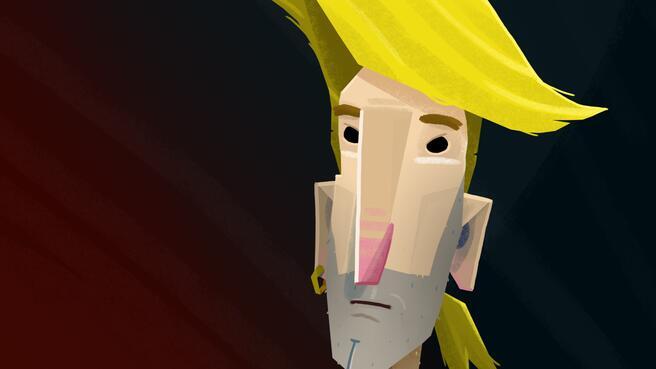
What’s new is old again
So let's skip the extravagant context of the announcement of this new episode, the April Fool's Day joke, to try to guess right away the conditions in which the new adventures of Guybrush Threepwood were imagined. What could a new episode bring? We remember that Ron Gilbert had prophesied in a post on his blog on April 13th, 2013, how he imagined another game from the series, very classic, in pixel art, with verbs, icons and a whole bunch of juicy retro stuff. But we have since known that most of the elements he wanted to implement were concretized in Thimbleweed Park. The new Monkey Island project, which owes its existence to a curious combination of circumstances and an unlikely agreement between Devolver and LucasFilm Games, therefore had to start on new bases. You must imagine the primary exchanges between Ron Gilbert and Dave Grossman. What can we say that is relevant? How do you satisfy a legion of obsessed nerds and a slew of potential new fans? A question that many creators have asked themselves in recent years, especially in the world of cinema by resuscitating the old glories of Star Wars, Jurassic Park, Star Trek, Matrix, Ghostbusters and the like, with very variable success. A puzzle that confronts two ambivalences.
On the one hand, there is the heritage, to comfort the fans and offer them something capable of reviving the feelings of yesteryear. On the other, there’s a necessity to offer something new so as not to fall into the remake and possibly seduce new players/spectators. From the first teaser released in April 2022, the first radical choice jumped out at us all. The artistic direction entrusted to Rex Crowle was literally going to cut with the past and the possible expectations that we, fans, could have had. Apart from an obvious and real artistic will from Gilbert and his crew, there is, of course, this desire to turn a page. No pixel art, no retro nostalgia, Return to Monkey Island is part of a new modern Point and Click rut, at least in appearance. We now know the mixed reception of the public towards this radical choice, funny thing when we know that, in any case, each episode of Monkey Island proposed a different artistic direction (even the second one) and thus perpetuates a certain tradition. If you're reading this review, chances are you've already completed this new adventure and realized for yourself that Return to Monkey Island works beautifully from a purely visual standpoint. The careful animation down to the smallest details of the backgrounds gives Mêlée Island a new life. A crazy dynamism runs through each screen and, quickly, doubts are dismissed. Never before has the facial animation of the characters rendered emotions, looks and breaths so well. Return to Monkey Island even allows itself, perhaps for the first time in such an effective way, to integrate silences into its staging, further accentuating the narration. Obviously, the voice acting is amazing. The performances of each actor are perfect. They are funny, embodied, almost palpable and definitely contribute to making those characters believable, funny and immersive. The almost transparent use of certain 3D elements, perfectly embedded into the classic 2D decorum, is as subtle and effective as the multiplication of additional animations which in no way affect the readability of the action. In short, Return to Monkey Island is beautiful as hell, polished like a jewel and fits perfectly into the elite of modern games without having to blush at all.
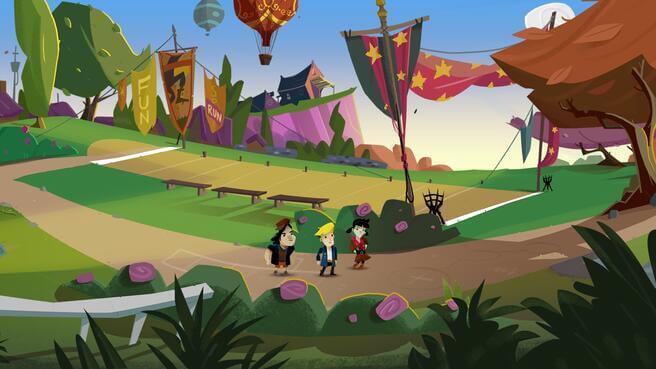
Even more obvious, the efforts made to dust off the antediluvian legacies of the Point & Click genre, which I personally expected more than anything, reinforce this necessary openness to a new audience. Ron Gilbert confided it recently on Twitter: “The UI code is the most complex part of the system”. If The Secret of Monkey Island laid the groundwork for modern adventure games in 1990 (cf. Why adventure games suck), Return to Monkey Island had this induced pressure to offer something again, new leads, we expected no less from Gilbert. it's clear that the subject was taken very seriously. Unlike Thimbleweed Park, and to meet modern expectations where the rhythm constraints imposed on the player are no longer acceptable (today it's unthinkable to stay stuck for days on a puzzle when barely two hours after the release of the game, an incredible number of walkthroughs swarmed on Youtube), the game first integrates an incredible assistance system materialized by the hint book. Smarter than a walkthrough, more educational than online help and, above all, more finely personalized to give only the bare necessities useful to the player, the hint book is indisputably packed with an ingenuity which had, I imagine, taken hours of tough coding. But where the UI is perhaps more revolutionary than it seems, it's on this set of details that enrich the overall quality of gameplay. Guybrush runs and twirls like never before with fluidity, the simple movement of the mouse cursor over an interactive element generates a commentary, sometimes funny, often informative, on the possibilities offered to the player. It's as simple and brilliant as it's instantly indispensable for the future of point and click. Overall, Return to Monkey Island offers an enjoyable quality of gameplay. The adventure game is getting rid of a thirty-year-old interface that needed something drastically different and is a welcome tweak. Everything is soft and fluid, enveloping the player in a cocoon allowing them to focus on the game, its puzzles and its legacy.
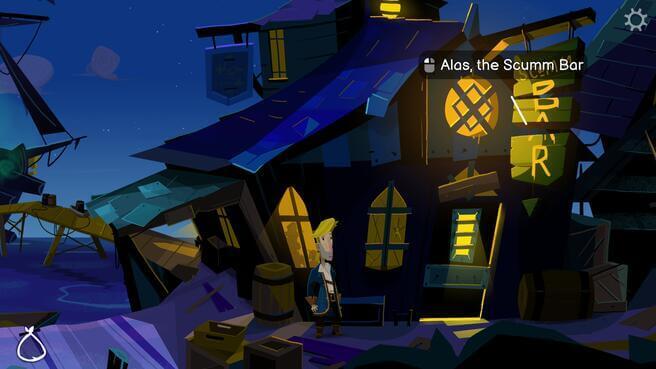
Look behind you…
If there is a promise, an expectation, that the pirates of Terrible Toybox have not betrayed, it's delivering a real point and click. Despite a refreshed interface, its revolutionary hint book, and its (sharp as a cutlass) art direction. Return to Monkey Island is a certified real Adventure Game™ with full dripping puzzles. This is the legacy. Monkey Island has not become a walking simulator, a multiple-choice narrative game or a simulation of moving wooden boxes (hello Georges Stobbart). Return to Monkey Island is probably the most virtuously traditional ofthe modern point and click games. There are puzzles, dialogues, puzzles within dialogues, items to combine, trade, steal, a quest (find Monkey Island's secret), sub-stories (get hired, make a beautiful mop, win a joke contest…) and keys. Lots of keys. A whole bunch of shiny keys. But that also means there's backtracking, plenty of backtracking, twisted puzzles, sometimes contrived and redundant, and questionable pacing, especially in Act 4 and some surprisingly underused settings (Brrr Muda and more specifically Terror Island seem so little exploited after all... without even mentioning Cogg Island of course). I would be on the verge of believing that a good part of the adventures originally imagined for Guybrush were edited out at some point during production to meet the game's release deadlines, but we will probably know a little more in the months to come.
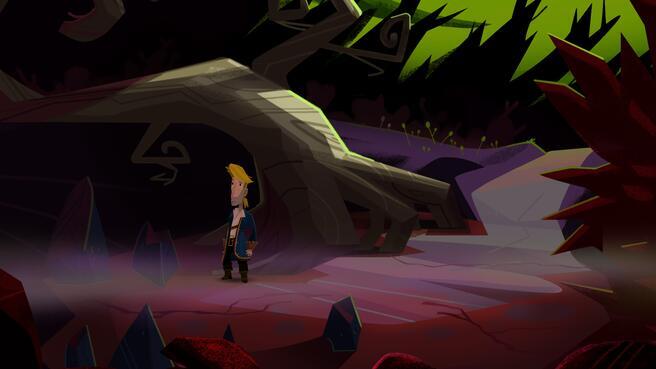
Another promise kept which immediately allows old nostalgic players, including myself, to feel at home: the soundtrack orchestrated by the three stooges: Michael Land, Clint Bajakian and Peter McConnell. I won't have enough space here to expand on the genius (yep, genius) in using the saga's historical themes to subtly underscore the feelings that pepper Guybrush's new adventures. It's an anthology of references, winks, and messages that the musicians, visibly delighted to sail again on the Caribbean seas, send us. And curiously, it's also the glaring absence of new outstanding themes that prevents me from continuing the praise. If it's intelligently exploited and brilliantly brought up to date, the music is discreet, almost erased in the sound mix for the atmospheres and the sound effects. A curious choice that completely denotes the conceptual musical omnipresence of Monkey Island 2 and the operatic auditory treat that was The Curse of Monkey Island for example. Nevertheless, it's necessary to recognize that for the first notes of the famous themes on the starry night of Mêlée Island, the recipe works and it's very difficult to hold back a few tears…
Obsessions
It was probably the most anticipated moment, the most dreaded too, of course. The original promise of this Return to Monkey Island was to provide a sequel to the end of Monkey Island 2. Mission impossible, remember? The prologue of the game is, probably, one of the scenes that required the most polish possible. I am convinced that it took a significant number of iterations to achieve this result. In one hour, perhaps one of the most prodigious moments of the whole saga, Return to Monkey Island gives everything. Dizziness. Boybrush and his friend Chuckie are slowly approaching a bench on which Guybrush, our Guybrush, is waiting, dreaming, staring into space. The years have passed, for him as well as for us, and our antihero offers to tell yet another adventure where the famous secret of Monkey Island has finally been revealed to him. The contract is done. Guybrush, it's you, it's us, it's this old player who has grown up, who is no longer a child, who finds these well-known places of a distant childhood. In front of the abandoned land that used to be Stan's brand new second-hand boat shop, Guybrush remembers better days "It was such a bright and lively place back then". Tempus fugit. We come across familiar old faces and sassy young pirates. The council of pirate leaders was dismissed in favor of a trio led by Madison, claiming to know better the uses of piracy than the old ones. We would be on the verge of hearing Gilbert, Grossman and the whole gang give here a slightly cynical metaphorical look at the range of young developers who followed them. Backgrounds testify to the changes, the old veterans that we met before have been converted and even if some places, like the Scumm Bar, do not change that much. If the entire first part borders on graceful and nostalgic reverence, where even the objects to find (brilliant idea) take the form of a trivia to test your level of nerdiness, the rest of the adventures take another turn.
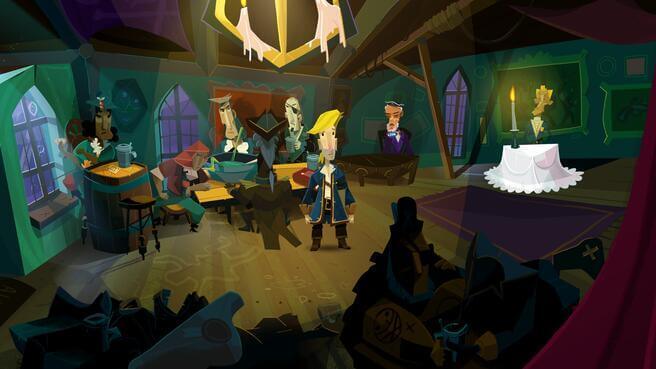
During Guybrush's quest to find the famous Secret of Monkey Island, interspersed with Boybrush’s interludes (another brilliant and adorable idea, so metaphorical of this object of father/son transmission that Monkey Island has become...), a realization slowly emerges. Is all this really worth it? Elaine asks the first question herself. Why such an obsession with this chimera of which, ultimately, very little we know about. Guybrush and his lifelong antagonist, LeChuck, share that same blind obsession to find...we're not sure what. Knowledge? Treasure? maybe… This obsession shown by the protagonists, of course, illustrates ours. Our obsession with having harassed Ron Gilbert, his loved ones and his family with this same question: “What the fuck is this SECRET???? for thirty long years. An obsession that has completely changed the way of perceiving this universe by its fans and its creator. Ron Gilbert admits it himself, he did not really have a preconceived Machiavellian plan when he left LucasArts back in 1992. Just a few vague ideas for gags, characters... And finally, this famous Monkey Island 3a became Return to Monkey Island, a metaphorical reflection on obsession, fandom, blindness... even if it means missing the point. Of course, the ending, moving as hell, pours into the rather classic and disappointing observation of: "It's not the destination that counts, it's the journey" by making Guybrush (and the player) understand that during all these years, it was not so much the Secret that constituted the real interest of the series, but all the adventures traversed. It may be an easy trick if, however, there was not this ultimate shot. Guybrush is on his bench, still motionless, staring at the screen. Should we read a certain nostalgia there? The promise of other adventures? I see it, above all, as a fictional character joining a video game pantheon, a character who has gone through the ages, from the beginnings of 2D, through rudimentary 3D to the episodic format. We now know that Guybrush will always be there to tell us new stories of pirates and treasures. A character who has always been there, benevolent and naive, boastful and crafty. Guybrush it's you, it's us: obsessed, passionate, sympathetic at times and often infuriating.
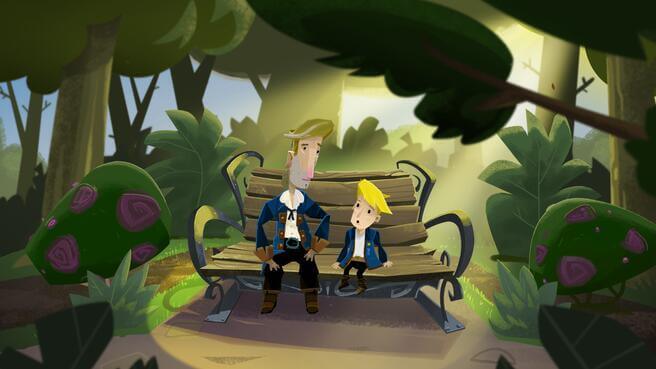
High adventures
But don't these multiple metaphorical layers on the gamer’s role, on the fandom, on our relationship to consumption, on our obsessions and even on the medium itself erase the real adventure that is Return to Monkey Island? Because, in the end, apart from what the authors want to tell us, we haven't yet asked ourselves whether this ultimate effort by Gilbert and Grossman is a good game. By piling up too many reflections and, sometimes, getting lost in narrative digressions, some work gets lost and forgets why it exists. Return to Monkey Island is a good game, pleasant, very accessible (in a good way), flattering the retina and the intelligence of the players. Return to Monkey Island isn't the masterpiece of adventure gaming, the pinnacle of a genre, that Monkey Island 2 may have been in its day. Many of the narrative paths are already seen, the backtracking takes a prominent place and the real interest is slightly lost during an adventure that, at times, lacks breath. Return to Monkey Island is often funny, wonderfully written, and offers the bare minimum of colorful characters, but we expected no less. But, above all, Return to Monkey Island is a fascinating work: a mirror held up to nerds, to fans, a nostalgic and relevant reflection on the last thirty years of gaming. Return to Monkey Island is an object both very consensual in its form, in its accessibility, and very radical at a deeper level, bitter, harsh, disarming and disillusioned. Inevitably disappointing since it will never correspond to the insane expectations of the players, but exciting and sincere, Return to Monkey Island is a proposition that very much looks like the different facets of the people who made it happen.
Thank you.